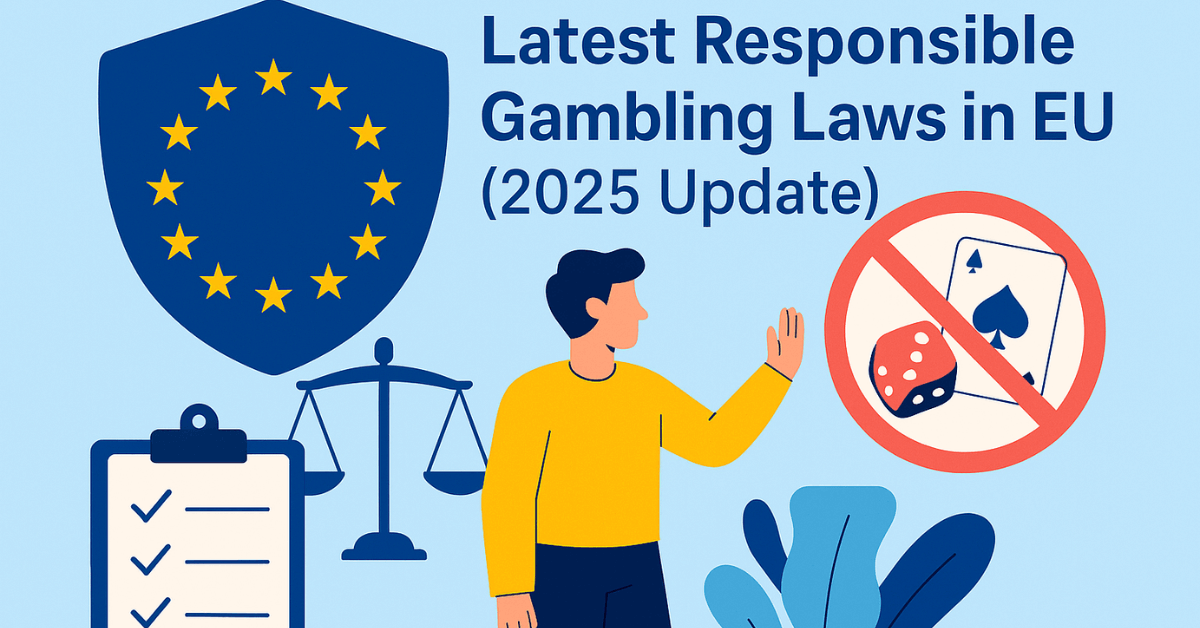
As online gambling continues to evolve rapidly across Europe, regulators are tightening controls to protect vulnerable players and ensure industry-wide compliance. In 2025, several EU countries have introduced or updated their responsible gambling regulations, impacting operators, affiliates, and players alike. This article explores the key developments in responsible gambling regulation in the EU and what they mean for the future of iGaming.
Why Responsible Gambling Regulations Are Evolving
The rise of digital gambling has increased concerns around addiction, underage participation, and aggressive marketing practices. In response, EU governments and regulators have stepped up efforts to create safer gambling environments.
Factors driving these regulatory changes include:
- Increased rates of problem gambling reported during the pandemic and post-lockdown years.
- Pressure from consumer advocacy groups demanding better protections.
- EU-level efforts to create a harmonized standard across member states, especially with cross-border gambling operators.
- Technological advancements enabling more personalized interventions and tracking.
Major Country-Specific Updates in 2025
Germany
Germany’s GlüNeuRStV (Interstate Treaty on Gambling) has been further revised to include stricter affordability checks and mandatory intervention systems. Operators must now:
- Implement AI-driven tools to detect problematic behavior in real time.
- Restrict bonuses to a fixed limit across all brands per player.
- Increase transparency in terms of win/loss records per session.
Netherlands
The Kansspelautoriteit (KSA) has expanded its CRUKS (Central Exclusion Register) functionality. All licensed operators are now required to integrate more robust tools for:
- Player self-assessment checks
- Enforced cooling-off periods
- Transparent communication of risks
Additionally, a total ban on untargeted advertising (TV, radio, outdoor) has taken effect.
Sweden
Sweden’s Spelinspektionen has enforced new restrictions:
- A monthly deposit cap of SEK 4,000
- Only one bonus allowed per customer across all operators
- Mandatory display of real-time gambling statistics in-game
These measures aim to curb excessive gambling behavior without banning gameplay outright.
Spain
Spain has doubled down on its restrictions by enforcing:
- A ban on gambling sponsorships in sports (including shirts and stadiums)
- Limitations on welcome bonuses (now max €100)
- More aggressive targeting of illegal operators
Additionally, platforms must present RG messages before and after each session.
UK (still relevant for EU operators)
Although no longer in the EU, UKGC’s White Paper is shaping the future of responsible gambling laws. Key features being adopted or mirrored by EU countries include:
- Mandatory stake limits
- Enhanced KYC/AML procedures
- Standardized affordability assessments
UK is also pioneering the use of behavioral data for early intervention and has made “tooling” for gambling blocks more accessible.
Malta (MGA)
The Malta Gaming Authority (MGA) is leading innovation with its new Player Protection Directive which requires:
- Operators to integrate machine learning tools for risk profiling
- Enhanced training programs for customer support teams
- Regular auditing of RG tools and transparency reports
France
France’s ARJEL, now part of ANJ (Autorité Nationale des Jeux), has introduced:
- Tax reform incentivizing RG-compliant behavior
- A centralized RG platform accessible by all players
- Mandatory break reminders after 60 minutes of continuous play
How These Changes Impact the Industry
Operators
Operators now need to adapt quickly to a complex, multi-jurisdictional regulatory environment. Key impacts include:
- Rising compliance costs (tech upgrades, staff training, audits)
- Reduced ability to use bonuses as acquisition tools
- Greater scrutiny over marketing and affiliate practices
Affiliates
Affiliates face pressure to adapt to new marketing guidelines:
- Must remove misleading offers (e.g., “risk-free play”)
- Need to include RG messaging and disclaimers
- Are liable for directing traffic to non-compliant operators
Those who align with the regulations early will have stronger relationships with licensed operators.
Players
Players now have more tools to manage their gambling behavior, including:
- Universal self-exclusion lists (e.g., CRUKS, ROFUS)
- On-screen statistics and time reminders
- Personal spending limits and reality checks
This new era of regulation aims to promote safer, more transparent play.
What It Means for the Future of iGaming
The trend toward player protection will continue, especially as data analytics and AI provide new capabilities for monitoring behavior. We can expect:
- Standardization across EU countries to simplify operator compliance
- Integration of RG tools at platform level, not just operator level
- Regulatory pressure on game developers to design less manipulative mechanics (e.g., limits on autoplay or LDWs)
Final Thoughts
Responsible gambling regulation in the EU is becoming more robust and complex. For the iGaming industry, the message is clear: evolve or face penalties.
Operators and affiliates who embrace compliance, transparency, and player protection will not only meet legal obligations but also gain trust and long-term customer loyalty.
Staying informed, investing in RG infrastructure, and aligning with ethical standards are now non-negotiable for sustainable success in European markets.